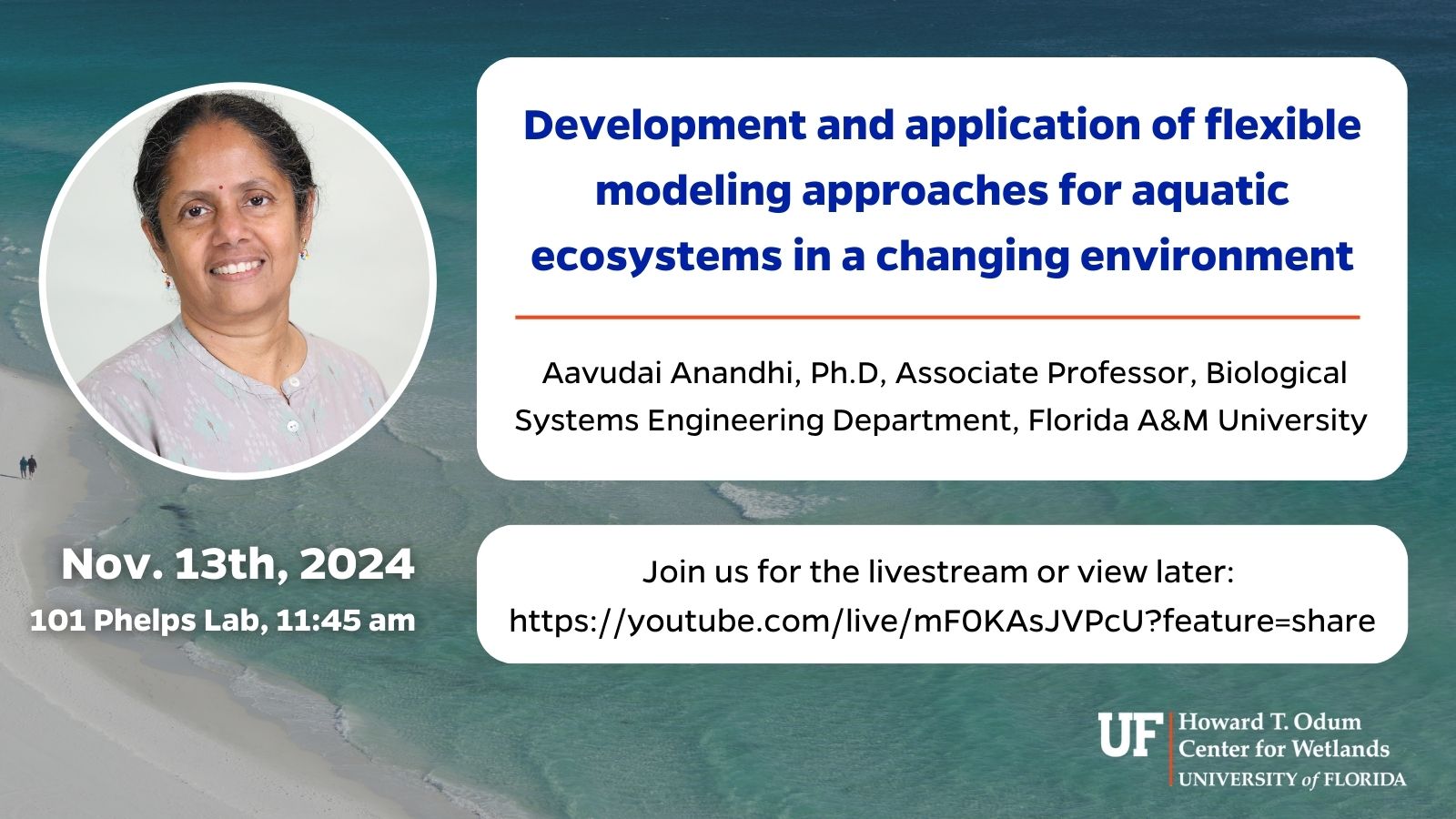
Aavudai Anandhi, Ph.D., Associate Professor, Department of Biological Systems Engineering
Join us for the livestream November 13th, 11:45am ET: https://youtube.com/live/mF0KAsJVPcU?feature=share
(Please visit our YouTube channel main page for the stream if there are any issues with the direct link.)
ABSTRACT
As the intensive use of natural resources continues to place significant pressure on aquatic ecosystems (e.g., hypoxia in the Gulf of Mexico), numerous methods and models have been explored in the literature. However, finding equitable solutions for both people and the planet requires open dialogue and accessible scientific information. Despite various approaches, a gap remains in the availability of adaptable, user-friendly tools that are flexible, scalable, and capable of comparative analysis.
This presentation aims to address this gap by introducing a flexible modeling approach for ecosystems in a dynamic and evolving environment. The core objective is to explore the development and application of tools such as ASSET (An Indicator-Based Tool to Estimate Water Consumption), VISTA, and CISTA. ASSET is a novel tool designed to estimate water consumption, while VISTA and CISTA are valuable in translating theoretical concepts into operational frameworks for vulnerability assessments and adaptation strategies. These tools provide flexibility in application across diverse scenarios, allowing us to tackle complex problems holistically and develop innovative solutions in an increasingly interconnected world.
Through case studies, we will demonstrate how these tools support decision-making and analysis at varying levels of complexity. The presentation will conclude with a discussion on how ASSET and similar tools can be customized to meet the needs of various stakeholders, including scientists, water managers, farmers, decision-makers, citizens and planners. The ultimate goal is to a be part of the team creating flexible solutions for improved aquatic ecosystems in the face of environmental challenges.
BIO
As an Associate Professor at Florida A&M University (HBCU) and a Professional Engineer (P.E.), the focus has been on environmental change applications across diverse regions, including the Ogallala Region, the Northeastern United States, the Southeastern United States, and South Asia.
Our group is dedicated to developing novel tools, models, and frameworks to address environmental change vulnerability and adaptation, aiming to enhance environmental resilience in various ecosystems. Utilizing over 150 indicators and conducting more than 10 systematic literature reviews, the group synthesizes existing methods, identifies knowledge gaps, and addresses challenges related to environmental change adaptation, resilience, and mitigation. The work spans agroecosystems, pasture/rangelands, coastal systems, urban areas, forest systems, and natural resources (land and water).
Expertise in our group lies in integrating complex systems thinking, indicator-based approaches, and computational intelligence to model processes and interactions within these ecosystems, thereby improving decision-making and predictions regarding environmental changes, such as climate and land use. Contributions are reflected in over 80 publications, more than 160 presentations, and over $18 million in grant funding as Principal Investigator, Co-Principal Investigator, or collaborator.
My team and I have earned several prestigious awards, including the Excellence in Education Award, Women in Engineering Award, Emerging Researcher Award, Teacher of the Year, and Blue Ribbon Award for innovative educational aids. Additionally, over 30 student awards and scholarships have been achieved by Ph.D., master’s, and undergraduate students from underserved populations.
Our philosophy is “Let’s grow together with simplicity, authenticity, awareness of blind spots, and gratitude.” This guiding principle underscores the commitment to assessing, adapting, and mitigating our natural resources in response to the inevitable changes in our environment.
POSTCARD
